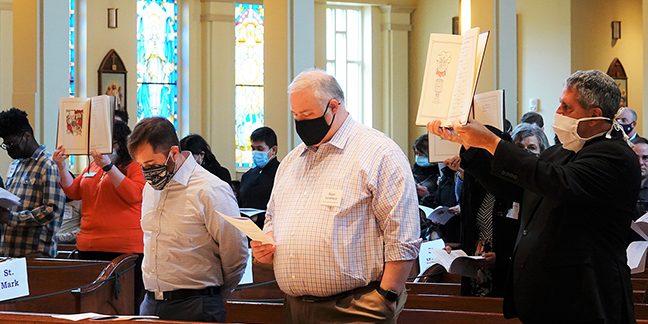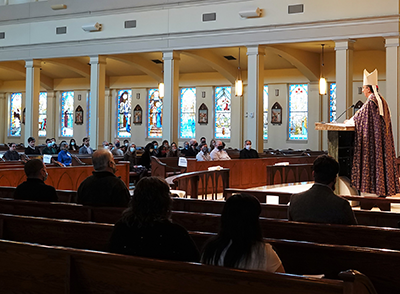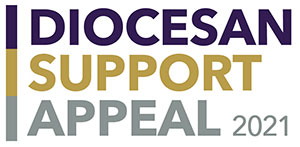‘It truly is a blessed time’
 CHARLOTTE — Who would want to become Catholic in the middle of a pandemic? Turns out, quite a few people – despite churches being closed and public health measures limiting large gatherings for much of the past year.
CHARLOTTE — Who would want to become Catholic in the middle of a pandemic? Turns out, quite a few people – despite churches being closed and public health measures limiting large gatherings for much of the past year.
Final numbers will not be available until after Easter, but 96 adults from 22 parishes attended three “Rites of Election” held recently with Bishop Peter Jugis. The Rite of Election is one of the final steps in an adult’s journey into the Catholic Church – a process of instruction, prayer and guidance known as the Rite of Christian Initiation of Adults, or simply RCIA.
The pandemic has impacted the number of people taking part in RCIA this year compared to last year, parish and program leaders acknowledge, but everyone has adapted and is making the best of things.
“The world has seen a variety of cataclysmic events over the centuries, and yet, souls show up at our church doors each and every year asking how to become an integral part of our faith communities,” says Deacon Mike Zboyovski, RCIA director at St. Eugene Parish in Asheville for more than 20 years and member of the diocese’s RCIA commission. “For two millennia, committed Catholic Christians have joined hands with inquirers and have assisted them in their catechesis.”
Modern technology has made things a bit easier – Zoom calls instead of in-person catechism classes, for example.
“The creativity at the parish level in getting folks instructed has been awesome to watch,” notes Chris Beal, director of the diocese’s Education Office, which oversees the RCIA program.
Yet the more formal steps on the journey to entering the Church – including the Rite of Election – have remained in-person events. And most parishes are preparing to welcome their people (called “catechumens” if they have not been baptized, “candidates” if they have) during the Easter Vigil on April 3, as is tradition.
One of the largest classes in the diocese this year is at St. James Church in Concord, which has 20 people in its bilingual RCIA program.
Virtual classes have been unavoidable with the pandemic precluding large gatherings, “but that is not the preferred approach for catechesis,” says Redemptorist Father Jerome Chavarria, pastor. “This style of formation is not without flaws and challenges, but it is the best that we can do for now. COVID has made all ministry challenging.”
 In-person meetings when possible have been particularly helpful for Spanish-speaking participants and their sponsors, he says. “These classes are important because many of our Hispanic adults haven’t had the opportunity for faith formation because of the challenges of migration and finding employment.”
In-person meetings when possible have been particularly helpful for Spanish-speaking participants and their sponsors, he says. “These classes are important because many of our Hispanic adults haven’t had the opportunity for faith formation because of the challenges of migration and finding employment.”
One of the catechumens at St. James Church is Maria Guadalupe Cano Dimas. Her husband and two of her four daughters are Catholic. The 29-year-old was raised a Jehovah’s Witness but felt the call to become Catholic six years ago when she started attending St. James Church.
“The classes I have been attending started off in person, then it was changed to virtual for the safety of everyone. It has been a little challenging doing virtual since I have a lot to learn, but I have a lot of help from my catechist,” Dimas says.
She wants to become Catholic “because I want to live in the real world and want to be happy while I’m in it. What better way than being in a church that makes you feel the love God has for His children without doubt or judgments?”
Trent Lucas, who became Catholic himself two years ago, now serves as interim RCIA coordinator at St. Patrick Cathedral in Charlotte. He is guiding eight RCIA participants this year, about half the usual number, he says, but all committed to joining the Church.
“I think the past two years, we had around 15. I would say that the pandemic played a large role in that, as we had far less people than usual inquiring about becoming Catholic (this year),” Lucas notes.
The smaller size has enabled them to meet in person since August, though a Zoom call option has been available for anyone who cannot make it in person.
Braden Fisk, 28, is a catechumen in the cathedral’s RCIA program whose job requires him to work later in the evenings. He appreciates Lucas’ efforts to help him complete the instruction via Zoom meetings or one-on one-sessions as needed.
“He has graciously given his personal time to catch me up on weekends – I suspect that’s a trait not unique to St. Patrick, and I will pay it forward whenever possible,” Fisk says.
Fisk is entering the Church before getting married in April to his fiancée, who is Catholic.
“I’ve always been ‘spiritual’ but never had a formal or structured religion,” he says. “Much of my family were raised Catholic and we’d go to church when together during the holidays… Then I met my fiancée, whose family also happens to be Catholic, and decided to explore as it was important to me we get married in a Catholic setting. Finally, after learning more about the Church’s values and understanding what Catholicism is really about, I gained a new respect and appreciation.”
Deacon Zboyovski says this is what the journey into the Church is all about: discovering the beauty, truth and goodness of the Catholic faith in a way that speaks to each person’s heart.
“It truly is a blessed time,” he says, and despite the challenging times of the present moment, his faith is “constantly enriched by witnessing the love of our diocesan clergy, parish catechetical teams and parishioners engaging and encouraging those about to celebrate the beautiful sacraments of initiation.”
— SueAnn Howell, Senior reporter
Pictured: One of three Rites of Election in the Diocese of Charlotte this year was held at St. Mark Church in Huntersville Feb. 27. During the rite, each parish presents its candidates and catechumens to the bishop. The Rite of Election was also held at Immaculate Heart of Mary Church in High Point and Immaculate Conception Church in Hendersonville. (Photos provided by Amy Burger)

Your DSA contributions at work
RCIA programs are among those funded in part by the annual Diocesan Support Appeal. Learn more about the DSA and how to donate online at www.charlottediocese.org/dsa.


